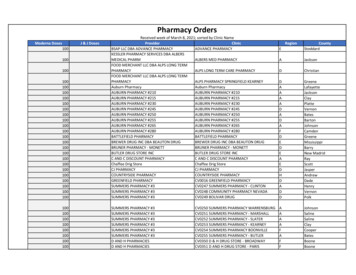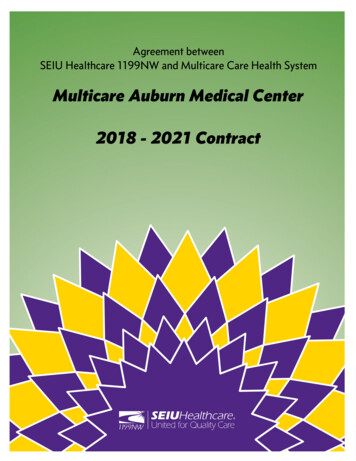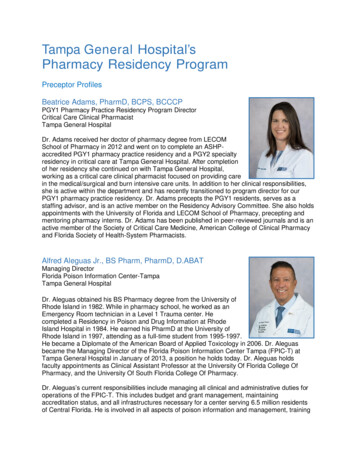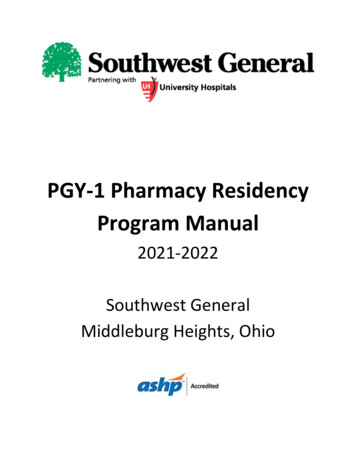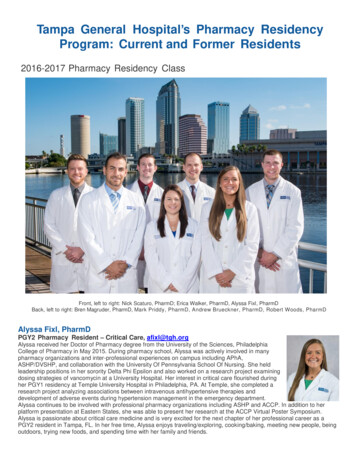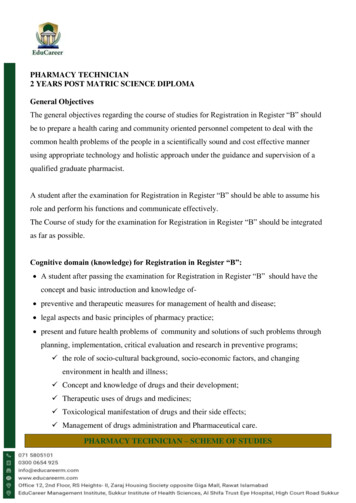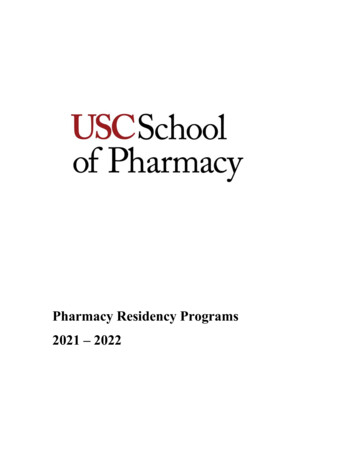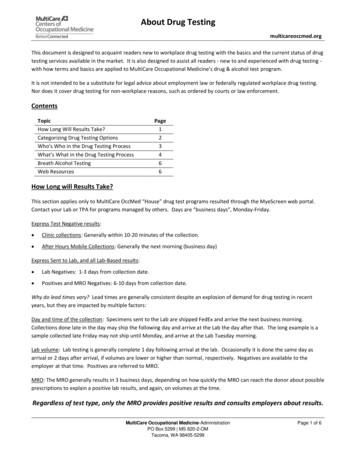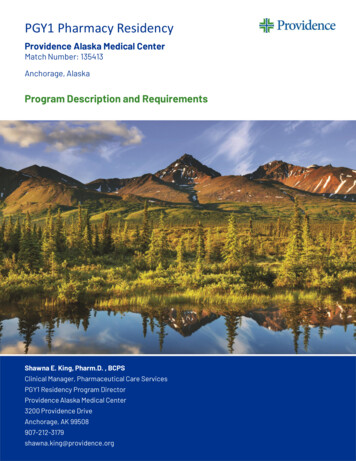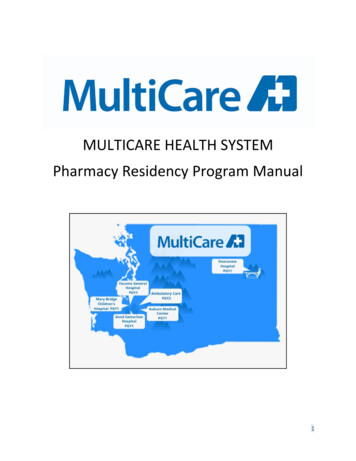
Transcription
MULTICARE HEALTH SYSTEMPharmacy Residency Program Manual1
Table of ContentsIntroduction . 4General Description and Background . 4Purpose . 4Mission, Vision, Values, and Key Philosophy Statements . 4Structure and Responsibilities . 6Resident Learning Programs . 10Role of the Pharmacy Resident . 10Role of the Preceptor . 10Program Management and Evaluation . 10Personnel Policies . 13Candidate Application, Screening, Interview, Rank, and Match. 13Licensure . 14Pre-Employment Requirements . 14Terms of Residency . 15Letter of Acceptance, Contracts, and Job Description. 15Orientation and Training . 15Resident Work Hours . 15Resident Time Off / Leave of Absence . 16Dismissal . 17Credentialing . 18Benefits . 18MultiCare Auburn Medical Center PGY1 Pharmacy Residency . 19Leadership . 19Program Goals. 19Training Site Description . 20Learning Experiences . 20Goals and Objectives. 23Requirements for Successful Completion of Residency . 23MultiCare Deaconess Hospital PGY1 Pharmacy Residency . 24Leadership . 25Program Goals. 25Training Site Description . 252
Learning Experiences . 27Requirements for Successful Completion of the Residency . 30MultiCare Good Samaritan Hospital PGY1 Pharmacy Residency . 31Leadership . 31Program Goals. 31Training Site Description . 31Learning Experiences . 32Duty Hours and Moonlighting. 33Goals and Objectives. 34Requirements for Successful Completion of the Residency . 34MultiCare Mary Bridge Children’s Hospital PGY1 Pharmacy Residency . 36Leadership . 36Program Goals. 36Training Site Description . 37Learning Experiences . 37Goals and Objectives. 39Requirements for Successful Completion of Residency . 39MultiCare Tacoma General Hospital PGY1 Pharmacy Residency . 40Leadership . 40Program Goals. 40Training Site Description . 41Learning Experiences . 41Goals and Objectives. 44Requirements for Successful Completion of Residency . 44MultiCare Ambulatory Care PGY2 Pharmacy Residency . 45Leadership . 45Program Goals. 45Training Site Description . 46Learning Experiences . 46Goals and Objectives. 47Requirements for Successful Completion of Residency . 483
IntroductionGeneral Description and BackgroundMultiCare Health System (MHS) is a not-for-profit health care organization that has been caring forcommunities in Washington state since the founding of Tacoma’s first hospital in 1882. With more than20,000 team members, including employees, providers, and volunteers, MultiCare is the largest, not-forprofit, community-based, locally owned health system in the state of Washington. Pharmacy services atMHS are well-established and cover the spectrum of pharmaceutical care, with extensive involvement inacute care, ambulatory care, community pharmacy, population health and managed care.Pharmacy residency programs at MHS: MultiCare Auburn Medical Center PGY1 Pharmacy ResidencyMultiCare Deaconess Hospital PGY1 Pharmacy ResidencyMultiCare Good Samaritan Hospital PGY1 Pharmacy ResidencyMultiCare Mary Bridge Children’s Hospital PGY1 Pharmacy ResidencyMultiCare Tacoma General Hospital PGY1 Pharmacy ResidencyMultiCare Ambulatory Care PGY2 Pharmacy ResidencyPurposePGY1 pharmacy residency programs build on Doctor of Pharmacy (Pharm.D.) education and outcomes tocontribute to the development of clinical pharmacists responsible for medication-related care ofpatients with a wide range of conditions, eligible for board certification, and eligible for postgraduateyear two (PGY2) pharmacy residency training.PGY2 pharmacy residency programs build on Doctor of Pharmacy (Pharm.D.) education and PGY1pharmacy residency programs to contribute to the development of clinical pharmacists in specializedareas of practice. PGY2 residencies provide residents with opportunities to function independently aspractitioners by conceptualizing and integrating accumulated experience and knowledge andincorporating both into the provision of patient care or other advanced practice settings. Residents whosuccessfully complete an accredited PGY2 pharmacy residency are prepared for advanced patient care,academic, or other specialized positions, along with board certification, if available.To accomplish this, the residency programs shall promote the development of clinical, analytical,organizational, and leadership skills necessary to provide pharmaceutical care as well as develop andimplement systems of care. MHS residency programs have adopted the ASHP Residency Program Designand Conduct to assist in the optimal learning of the resident.Mission, Vision, Values, and Key Philosophy StatementsMission: Partnering for healing and a healthy futureVision: MultiCare Pharmacy Services will be recognized as a world leader in pharmacy practice forquality of care, cost of care, compliance, and practice innovation.Pharmacy Services will: Recruit and retain the most capable and qualified staff to deliver exceptional care and customerservice to our patients4
Provide excellent stewardship of our resources and drug useAffect patient outcomes in a positive manner through our knowledge and optimization of drugtherapy, ability to educate, collaborate with others, and solve problemsStrive to use most current technology to improve safety and efficiencyCore Values: Respect, Integrity, Stewardship, Excellence, Collaboration, and KindnessRespect: We affirm the dignity of each person and treat each individual with care and compassion.Integrity: We speak and act honestly to build trust.Stewardship: We develop, use, and preserve our resources for the benefit of our customers andcommunityExcellence: We hold ourselves accountable to excel in quality of care, personal competence, andoperational performance.Collaboration: We work together recognizing that the power of our combined efforts will exceed whatwe can accomplish individually.Kindness: We always treat everyone we come into contact with as we would want to be treated.Key Philosophy Statements:HIGH RELIABILITY: The system has adopted the principles of being a Highly Reliable Organization (HRO)that defines the expectations, standard processes, and culture of excellence that results in patient andemployee safety. The culture supports employees doing the right thing and embracing transparency toensure patient safety. We communicate complete and accurate information at handoffs; ask questions;and know the patient’s story. Our focus is to eliminate harm to patients and co-workers. Thedepartment takes measured steps to use technology, including automation and advanced computersystems, to improve patient safety; be good stewards of our resources; and improve the efficiency ofthe delivery system. We employ a culture of continuous quality improvement. It is critical that wecontinually improve our processes, workflows, and care models to provide the most appropriate andcost-effective pharmaceutical care with zero defects. We use LEAN principles to eliminate waste,duplication, and non-value activity so that our customers and patients receive the highest standard ofservice from our department.BELONGING: MultiCare has embarked on a “Belonging Journey” to ensure racial equity. This involvesevaluation of the Health Equity Strategic Plan of 2015-2020 and development of a 2020-2025 HealthEquity Strategic Plan.TEAM APPROACH: We strongly believe in a collaborative and coordinated approach in providingpharmaceutical care to our patients. Our staff works within multidisciplinary teams to provide optimalpatient care. The department pursues opportunities to extend and improve services and systems of carein a manner consistent with MHS Vision statements. The work of pharmacists and technicians addsvalue and is well-integrated into the overall work of the healthcare team.PATIENT-CENTERED CARE: Pharmacists observe best practices for the care of all patients, and developindividualized care plans that incorporate patient preferences, needs and values. Patient education andshared decision making are integral to this approach. The practice model defines the minimum level of5
care patients can expect and a standardized process by which care is delivered. We continually pursueopportunities to expand our accessibility to patients.STAFF DEVELOPMENT: Our staff is the most valuable resource in the department. Staff development is aresponsibility shared by staff and management. Each staff member has a responsibility to remaincompetent, increase their capabilities, and remain relevant. Management has an obligation to providegrowth and development opportunities such that each person can increase their value to MHS and candevelop to their fullest potential. Innovation at the boundaries of healthcare shall be encouraged andsupported by the department.Structure and ResponsibilitiesMultiCare Health System Residency Advisory CommitteeMHS has a system-level residency program advisory committee (MHS Mega-RAC) which providesoversight of MHS pharmacy residency programs. This serves to connect MHS residency programs byestablishing a structure to unify and provide direction and oversight. Membership of the MHS Mega-RACis comprised of Residency Program Directors and Coordinators. MHS Mega-RAC reports to the MHSPharmacy Practice Council and Clinical Leadership Team, and information is communicated to eachspecific program’s Residency Advisory Committee (RAC).Residency Program DirectorThe residency program director (RPD) is responsible to ensure the program adheres to current ASHPaccreditation standards, the overall goals of the program are met, appropriate preceptorship for eachrotation is provided, training schedules are maintained, and that resident evaluation is a continuousprocess. The RPD must maintain an active practice within the practice specialty and is also a preceptor.The RPD is also responsible for the selection of residents. This decision shall be made based on therecommendations of the residency interview committee. The RPD will establish and chair the program’sRAC.PreceptorsPreceptors will be professionally and educationally qualified pharmacists who are committed toproviding effective training of residents and being exemplary role models for residents. Preceptors willhave demonstrated an ability to educate residents in their area of pharmacy practice.The RPD is responsible for designating preceptors for each specific learning experience. The RPD is also apreceptor. Preceptors are directly accountable to the RPD regarding their resident trainingresponsibilities.Preceptor RequirementsCurrent and prospective preceptors must meet the eligibility and qualification requirements set forth byASHP Accreditation Standards, Residency Program Design and Conduct (RPDC) standards.Preceptors must practice primarily in the location they wish to precept. To be considered as a newresidency preceptor, interested pharmacists will notify the RPD. After discussion of requirements, therequest will be reviewed by the RAC.RPD will annually evaluate potential preceptors and re-evaluate current preceptors based on ASHPpreceptor standards. Evaluation will also include the desire and aptitude to precept residents. Desire is6
determined based on subjective information and evaluations from current residents, desire to teach,and aptitude for teaching. Aptitude is based on meeting criteria set forth in the ASHP AccreditationStandards along with participation in preceptor development activities and evaluations from current andprevious residents.The RPD has the authority to add or remove preceptors at any time at their discretion.Preceptors not meeting the minimum criteria may be designated as preceptors-in-training for no longerthan 2 years. Preceptors-in-training will have a preceptor advisor and an individualized preceptordevelopment plan that is reviewed by RAC at least annually (see below: additional requirements forpreceptors-in-training).Preceptor ExpectationsPreceptors are expected to participate actively in the residency program’s continuous qualityimprovement processes; demonstrate practice expertise and preceptor skills and strive to continuouslyimprove; adhere to residency program and department policies pertaining to residents and services; anddemonstrate commitment to advancing the residency program and pharmacy services.Each residency learning experience preceptor is responsible for the following activities: Aiding RPD with developing specific goals and objectives for their learning experiencePreparing/updating learning experience descriptions as instructed by the RPDOrienting residents to their learning experience prior to or on the first day of the learningexperienceCompleting formative evaluations as scheduled in the electronic evaluation systemCompleting all summative evaluations within the electronic evaluation system no later than 7days from the completion of the learning experienceMeeting with the resident to discuss summative, self, and preceptor/learning experienceevaluationsSubmitting documentation of preceptor development activities to the RPD or designeePreceptor DevelopmentEach residency program is responsible for ongoing preceptor program improvement and ensuring a highlevel of competency for all pharmacists involved in precepting pharmacy residents. The RPD, inconjunction with the residency advisory committee (RAC), will be responsible for the following on anannual basis: An assessment of preceptor needsSchedule of activities to address identified needsPeriodic review of effectiveness of planAssessment of Preceptor Development NeedsAnnually, the RPD will review residents’ evaluations of preceptors and learning experiences, as well assolicit verbal feedback from preceptors, to identify potential preceptor development needs. Asapplicable, RPD will review ASHP residency accreditation site visit recommendations to identifyrecommendations or areas of partial compliance which pertain to precepting skills.7
Development Process for Annual Preceptor Development PlanThe RPD and preceptors will come to a consensus on preceptor development areas to focus on duringthe upcoming year. RPD utilizes a plan for improving the quality of preceptor instruction based on anassessment of residents, written evaluation of preceptor performance and other sources. Preceptordevelopment needs identified through the assessment process will be discussed annually as part of theend-of-year RAC meeting in June.The RPD (or a designee) will develop a tentative preceptor development plan for the upcoming yearwith activities to address areas of need and a schedule of activities and will present to the residencyadvisory committee (RAC) at the July or next scheduled RAC meeting.If preceptor development needs have been identified for individual preceptor(s) which will not be metby the current preceptor development plan, the RPD may also develop an individual plan for thesepreceptors in addition to the plan for the preceptor group.The preceptor development plan will be distributed to all preceptors and documented in the July or nextscheduled RAC minutes.Review of Effectiveness of Previous Year’s PlanA review of current preceptor development plan will occur at the annual end-of year preceptor meetingin June and documented in the minutes. Effectiveness of the plan will be assessed as follows: Review current preceptor needs assessment results to determine if these are still areas of needDiscussion with preceptors of the effectiveness of activities utilized over the past year toaddress preceptor development needsDiscussion of effectiveness of previous year’s plan will be used when developing topics,scheduling, and preceptor development activities for upcoming yearAdditional Required Preceptor Training for New Preceptors and Preceptors-In-Training1. Read and discuss the relevant Guidance Document for the ASHP Accreditation Standard forPGY1 or PGY2 Pharmacy Residency Programs with RPD2. Read Residency Manual and review components with RPDAdditional Requirements for Preceptors-In-TrainingAn advisor will be appointed to mentor the preceptor-in-training. The advisor will be required to co-signany summative evaluations completed by preceptor-in-training.The preceptor-in-training, in conjunction with RPD and advisor, will develop an individual plan designedto ensure preceptor-in-training meets all ASHP preceptor requirements within 2 years.Other Opportunities for Preceptor Development APhA and Pharmacist Letter have educational programs available to orient new preceptors andrefreshers for current preceptors University of Washington School of Pharmacy has web-based programs available to preceptors ASHP has web-based programs available to preceptors Preceptors may attend programs locally, regionally, or nationally to enhance their preceptingskills8
Those who attend meetings will share information at residency meetings or other forums asappropriateSelf-study materials will be sharedSystem ResourcesDrug InformationA computerized drug information retrieval system is available via the MHS information system networkwhich can be accessed by users most anywhere in the health system. The MHS information systemnetwork also allows for access to the internet for web-based drug information sites including OVID,Medline, Up-to-Date, Cochrane Stat Ref, and others. This also includes access to the MHS on-line drugformulary, which is maintained by the MHS Drug Information Specialist Pharmacist.Information TechnologyMHS uses the EPIC health information system and electronic medication record (EMR) for its acute andambulatory care services. The combination of the EPIC acute and ambulatory system provides clinicianswith a fully integrated health information system that allows improved quality and safety of care for ourpatients. MHS fully utilizes electronic dispensing cabinets throughout the acute care services as well asintegrated smart pumps and bedside bar code technology. In addition, carousel technology is used incentral pharmacy for medication storage, distribution, and inventory control.Medication SafetyMHS developed a system wide Medication Safety Program within the pharmacy department todemonstrate the unparalleled value our organization places on the safety of our patients and staffmembers. Two pharmacists and two technicians operate within the Medication Safety Program tocontinually support the system’s growth both retrospectively and prospectively around adverse drugevents. The Medication Safety Team actively collaborates with all pharmacies and system resourcesthroughout the system, while striving to lead initiatives to align with best practices related to improvingpatient safety. The interdisciplinary relationships fostered by the Medication Safety Team support ourorganizations journey to becoming a Highly Reliable Organization (HRO) and operating within a JustCulture.9
Resident Learning ProgramsRole of the Pharmacy ResidentResident learning is accomplished by combining preceptor teaching and work experience during a oneyear period. MHS residency programs allow residents to apply educational information and techniqueslearned to actual work situations. Residents are expected to demonstrate learned clinical practicebehaviors, apply learned concepts, and to use the residency experience to develop the array of skillsrequired to be a successful clinician.Organizationally, residents are a unique set of employees who experience both staff and managementroles. It is expected that each resident will integrate themselves into the staff and managementstructure of Pharmacy Services and contribute to the achievement of department goals. Each resident isalso expected to actively work with the program director and program preceptors to shape thecharacter of their individual program. Residents are expected to manage their program, which includesmaintaining relevant documentation, scheduling meetings, arranging their scheduling jointly with theirfellow residents, and other similar activities.Role of the PreceptorIt is expected that each preceptor, in conjunction with the resident and the program director, shall takepart in the development of the goal, objectives, and activities prior to beginning of each residenttraining experience. It is also expected that the preceptor shall attempt to cover, through topicdiscussions, each area of clinical pharmacy practice associated with their specialty. It is also importantthat the preceptor attempt to focus on any of the resident's areas of special interest and growth andtailor the learning experience accordingly. It is expected that the preceptor shall attempt to allow theresident as much "hands on" experience as safely possible in dealing with patients, medical staff, andnursing staff.Program Management and EvaluationThe extent of resident’s progression toward achievement of the program’s required educational goalsand objectives will be evaluated.Summative Evaluations of Learning ExperiencesSummative evaluation of the residents’ progress toward achievement of assigned educational goals andobjectives, with reference to specific criteria will be conducted after each learning experience by thepreceptor with the resident. For longitudinal rotations, evaluations will be completed on a quarterlybasis. The resident and preceptor will schedule a planning session at the start of each learningexperience to review and customize the established goals and objectives to the resident’s needs and toestablish mutual expectations of each other.Preceptors will check the appropriate rating for the goals and objectives being evaluated. In addition,preceptors may mark a goal as achieved for the residency program if all objectives associated with thatgoal were evaluated during the learning experience. Preceptors should use the following guidance forrating the goals and objectives:10
For GOALS:o Achieved for the Residency (ACHR) is earned for a goal if the resident can performassociated activities independently across the scope of pharmacy practice, and if theresident has achieved each objective associated with that goal.o Preceptors may mark a goal as ACHR only if all the objectives associated with that goal areevaluated during that learning experience. Otherwise, the RPD will assess and mark ACHRduring the quarterly evaluation and residency plan update. For ident is notperforming at anexpected level at thattime; significantimprovement isneeded in order tomeet objectivesSatisfactoryProgress (SP)Resident isperforming andprogressing at a levelthat shouldeventually lead toproficiency in theobjectivesGuidanceThe resident exhibits deficiencies in knowledge/skills forthis area. For example, the resident: Requires repeated prompting or assistance toperform daily activities, or cannot complete dailyactivities in a timely fashion Is unable to perform appropriate self-evaluation,or does not incorporate preceptor feedback
MultiCare Health System (MHS) is a not-for-profit health care organization that has been caring for communities in Washington state since the founding of Tacoma's first hospital in 1882. With more than 20,000 team members, including employees, providers, and volunteers, MultiCare is the largest, not-for-
